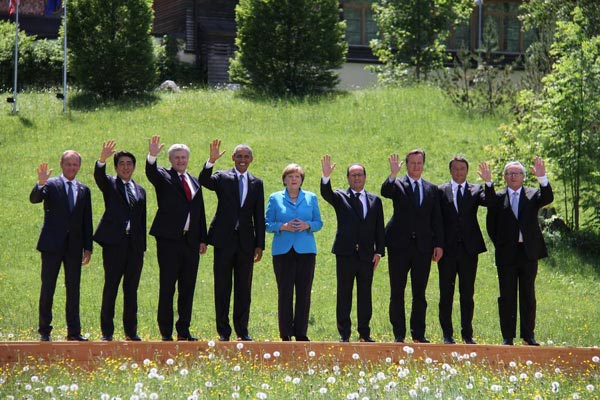G7 accused of ignoring the facts over South China Sea
By CHEN MENGWEI (China Daily) Updated: 2015-06-10 07:24
 |
|
Participants of the G7 summit (L-R) President of the European Council Donald Tusk, Japanese Prime Minister Shinzo Abe, Canadian Prime Minister Stephen Harper, US President Barack Obama, German Chancellor Angela Merkel, French President Francois Hollande, British Prime Minister David Cameron, Italian Prime Minister Matteo Renzi and European Commission President Jean-Claude Junker have a group photo taken at the Elmau Castle near Garmisch-Partenkirchen, southern Germany, on June 7, 2015. [Photo/Xinhua] |
Beijing accused G7 members of bias, ignoring the facts and irresponsibility on Tuesday as it rejected a statement made by the group targeting, but not naming, China over maritime tensions.
The accusations were leveled by Hong Lei, spokesman for the Chinese Foreign Ministry, at a news conference.
"What the G7 members have said and done are too far from the facts," Hong said.
"China strongly urges the G7 members to respect the facts, discard bias, stop making irresponsible remarks and focus on things that can really help to properly handle and resolve the disputes and contribute to regional peace and stability."
On Monday, leaders of the Group of Seven countries expressed concerns over tensions in the East and South China seas and called for nations to abide by international law. Their comments marked the end of a two-day summit in southern Germany.
"We strongly oppose the use of intimidation, coercion or force, as well as any unilateral actions that seek to change the status quo, such as large-scale land reclamation," the G7 leaders said, without naming countries. Many observers interpreted the statement as targeting China.
In his reply, Hong stressed that construction work by China on the Nansha Islands in the South China Sea is an act within its sovereignty with which no other countries have the right to interfere.
He also said the facilities are mostly for civilian use to better fulfill international obligations such as maritime navigation and rescue work.
Zhou Yongsheng, a professor of Japanese studies at China Foreign Affairs University, said the fact that the statement did not name China proves "inner conflict and struggle" within G7 is continuing. It was also a disappointment for Japanese Prime Minister Shinzo Abe, he said.
"Some G7 members, such as Germany and France, obviously do not want to be 'kidnapped' by Japan to sacrifice their friendship with China over something that really does not affect their interests," Zhou said. "As hard as Abe has tried to make this a big issue on the international stage, he has failed."
Abe had been widely reported as making lobbying efforts to put the maritime issues on the G7 summit agenda.
Jia Xiudong, a senior international affairs researcher at the China Institute of International Studies, said none of the G7 members have the right to meddle in the situation in the South China Sea, as they are not directly involved.
"Making statements like this and ignoring facts and justice will not enhance the voice of the G7 on the global political stage. Rather, it will diminish its image and weaken the group's influence," Jia said.
"No one within the group really cares about the South China Sea-not even Japan. This purely political move will not help the G7 to regain the reputation and influence it has lost to emerging organizations like the G20."
Jia said the G7 statement could make the South China Sea situation more complicated, as some parties that are directly involved may take it as a sign of an endorsement of their activities within Chinese territory.
- Commentary: South China Sea issue not major concern of Western countries
- Japan, the Philippines to hold maritime drill in South China Sea
- South China Sea not a US political playfield
- China rejects misinterpretation of lnt'l laws on South China Sea
- Chinese suspicious of US criticism of South China Sea dispute






